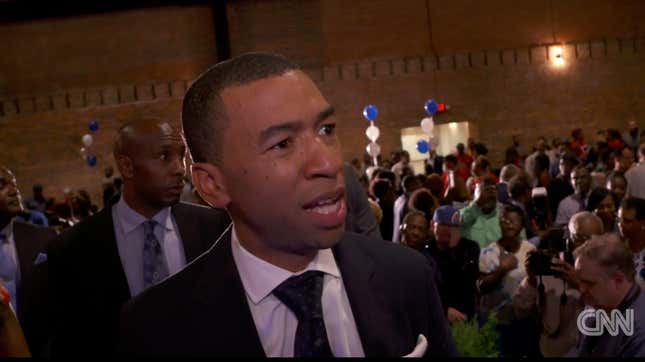
In more than 200 years, Montgomery, Ala.—the first capital of the Confederacy and the birthplace of the Civil Rights Movement—has never had a black mayor. That changed Tuesday night, with voters decisively electing county probate judge Steven Reed to office.
Reed secured 67 percent of the vote in Tuesday’s runoff election, beating his opponent, local TV station owner David Woods by 16,000 votes, reports CNN.
“This election has never been about just my ideas,” Reed said in his victory speech Tuesday night, according to the Washington Post. “It’s been about all of the hopes and dreams that we have as individuals and collectively in this city … and the way we found the opportunity to improve outcomes regardless of neighborhood, regardless of zip code, regardless of anything that may divide us or make us different from one another.”
Born and raised in Montgomery, Reed has made history in the state before: the Morehouse grad became the youngest and first black probate judge in Montgomery County in 2012. Notably, Reed was also the first probate judge in the entire state to issue same-sex marriage licenses in 2015.
Reed also expands on the legacy of his father, Joe Reed, a local politician who has served as chairman of the Alabama Democratic Conference for decades. According to the Post, the elder Reed was elected to the Montgomery City Council In 1975—along with three other black elected officials, they were the first black politicians to hold office in Montgomery since Reconstruction.
The 45-year-old judge announced his candidacy for the city’s highest seat earlier this year, telling the Montgomery Advertiser he wanted to tackle public education and safety issues, as well as attracting and retaining young people in the majority-black city.
Reed ran on a platform that emphasized investing in education—specifically, universal prekindergarten, improving access to affordable, healthy food, and expanding the city’s police force (most mayoral candidates agreed the department was understaffed, the Post notes).
Though Reed was not the only mayor to make history in Alabama last night (Talladega also elected its first black mayor, Timothy Ragland ), Reed’s victory is particularly resonant because of Montgomery’s unique history. The second-largest city in the state, it was the site of the 1955 bus boycott sparked by local seamstress and activist, Rosa Parks. Martin Luther King Jr. preached out of the Dexter Avenue Baptist Church, on the same street where Jefferson Davis took his oath of office as the first president of the Confederacy in 1861.
Montgomery is now home to the country’s first memorial to lynching victims, an important and long overdue landmark recognizing America’s brutal history of domestic terrorism against black Americans.
To many, Reed’s election marks a new chapter in Montgomery’s history.
Karen Baynes-Dunning, interim president and CEO of the Southern Poverty Law Center, a civil rights advocacy group based in Montgomery, lauded Reed’s election Tuesday.
“This is a historic day for our nation,” she posted on Twitter. “The election of Steven Reed, the first black mayor of Montgomery, AL, symbolizes the new inclusive & forward thinking South that so many have worked to achieve.”
Speaking to the Advertiser as votes were still being counted Tuesday, Reed said, “I take that with a great deal of humility and a great deal of responsibility, what that means to so many people who have been a part of Montgomery who have lived here and left here because of the racial terror they underwent and moved far, far away. And what it means to the people who stayed here and continue to chip away and who definitely want to see someone in this position that looks like them”
“I think I had to kind of take a step back,” he continued. “It’s way bigger than just Steven Reed.”

